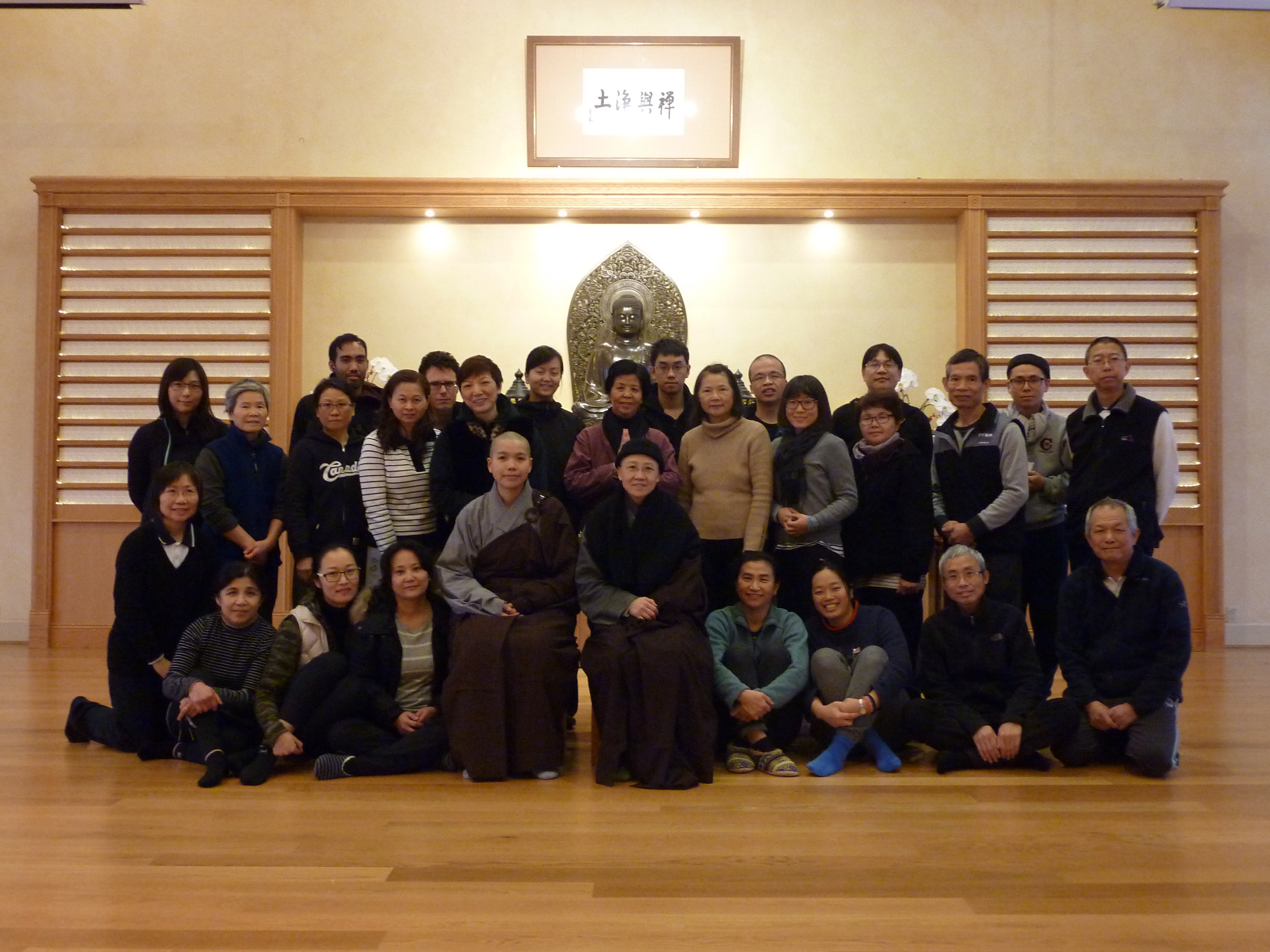A Report of Year-end 3-day Meditation Retreat at Dharma Drum Vancouver Center

I had an one-of-a-kind New Year’s eve at the end of 2016. There were no countdowns, but breath counting. There was no champagne and wine, but hearty vegan soup. There was no cheering crowd, but people to share silence and dharma talks. I feel refreshed and grounded after this three-day meditation retreat. When I heard about this retreat, I thought it would be a new way to celebrate 2017; it wouldn’t hurt to try it. I have to admit that Venerable Chang Wu has been very persuasive that doing Chan meditation is the best self-care.
Venerable Chang Wu talked about the deeper meaning of noble silence, self-compassion and mindfulness. Silence is not a usual and preferable part of busy modern life. Modern culture promotes outwardness and sensationalism. Thus, the meaning of being in silence and sitting still are undervalued and overlooked. In most capitalist and industrialized societies, high productivity and fast performance are emphasized and measured in terms of numbers and volumes. Under this logic, it may seem hard for some to see the worthiness of silence and meditation. To clarify, Venerable Chang Wu explains that the silence is noble, because it brings us inward and provides us with space to let go. That is because we were taught to believe that external objects are fundamental to our happiness. As the result, to be happy, we endlessly acquire more money, more fame, more friends and so on. In other words, we fulfill our lives through attachment. Meanwhile, behind the sadness and disappointment of not being able to have, there is an insecure self yelling loudly: ”I am hurting and I want more”. Thus, to hear the deep voice of ourselves, we practise noble silence. When outside interruptions are removed, we see our needs beyond material goods and superficiality.
Indeed, to meditate is to turn our attention inward with the awareness of the external world. It is because the cultivation of the bodhisattva path starts with the willingness to listen to and care for ourselves. To remind us of this, Venerable Chang Wu always asked us whether we had been nice to ourselves. Self-compassion means to relax and accept ourselves with mindfulness. It implies to free from expectations and to be nonjudgmental. For example, on the meditation mat, being self-compassionate means not compare our previous practise with today’s, not setting up a goal for a meditation practise. In other words, being goal-orientated and rushing into things bring feelings such as, disappointment, greed and anger. By doing that we value the outcomes instead of the process. Contrastively, cultivating self-compassion means focusing on the now and relaxing each part of our body; enjoying the process. Besides, cultivating self-compassion and realizing that many negative emotions and problems in relationships are rooted in the lack of self-compassion increase our capability to help and to endure. For example, the infamous phenomenon in which the abused becomes the abuser. Someone who struggles to love him-/her-self contributes to the karma of pain and suffering of their victims. Thus, we see self-hatred, self-blaming displayed outwardly as violence, anger, and anxiety. Since self-compassion and self-acceptance go hand in hand, meditating helps us to grow wisdom and awareness to learn our true nature and accept our authentic selves. No matter where we are in life, there is a Buddha nature in us waiting to be awakened.
During the retreat, Venerable Chang Wu repeatedly reminded us that mindfulness is the key to self-awareness and self-compassion. Why do we meditate? One function of meditation is to wake our Buddha nature. Why do we need to cultivate self-compassion? For Buddha is the one with great compassion. To me, eventually when oneself disappears, the self-compassion is the great compassion. How do we bring the mindfulness from the sutra, to the meditation mat, and to our world? Exercise noble silence for it is the first step to mindfulness. As Venerable Chang Wu patiently explained, practising mindfulness calls us to observe our body and movements without judgement and expectations; to feel our body from muscle to organs, from the crown of our head to the bottom of our legs, as slowly and relaxed as we can. Thus, we were encouraged to accept our inability to be sensitive, our flawed humanity and our imperfection without reaction. Meanwhile, accept our ability to be sensitive, our humanity and imperfection without reaction. When we are off our meditation mat, we observe our behaviors, languages and thoughts. As a result, we correct them according to Buddhist teachings.
Venerable Chang Wu’s question, “Have you been treating yourself well?” inspired me to practise more self-compassion. Loving the world starts from loving oneself. Our behaviors, emotions, languages and thoughts reflect our inner world. When our inner world is guided by compassion, we mirror compassion back to our communities. Meditation is the art of cultivating compassion, mindfulness through the noble silence; the art of cultivating samadhi and wisdom. Venerable Chang Wu was right that meditation is the best self-care, because meditating has the potential to affect our karma through changing our interactions with the world. It is the self-care for now, for the past and the future.
By Boxiao Chen